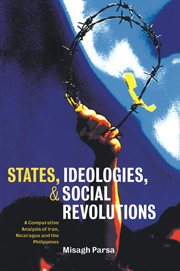 States, Ideologies, and Social Revolutions
States, Ideologies, and Social Revolutions Book contents
- Frontmatter
- Contents
- List of tables
- Preface
- Part I: Theory and structural background
- Part II: Mobilization and collective action
- Prelude
- 4 Students: relentless revolutionaries
- 5 Clergy: actors with relative impunity
- 6 Workers: rebels with dual targets
- 7 Capitalists: reluctant rebels
- Part III: Outcomes and conclusions
- Bibliography
- Index
5 - Clergy: actors with relative impunity
Published online by Cambridge University Press: 22 September 2009
- Frontmatter
- Contents
- List of tables
- Preface
- Part I: Theory and structural background
- Part II: Mobilization and collective action
- Prelude
- 4 Students: relentless revolutionaries
- 5 Clergy: actors with relative impunity
- 6 Workers: rebels with dual targets
- 7 Capitalists: reluctant rebels
- Part III: Outcomes and conclusions
- Bibliography
- Index
Summary
From some sociological perspectives, religious institutions and their temporal representatives have often been identiWed with the forces of inertia and societal reproduction (O'Dea 1966:2-18). Nevertheless, segments of the clergy have become politicized and proactive in social change projects during the past several decades in many developing countries. The clergy's politicization has come about, in part, because of the formation of exclusive rule, centralization of power in the state, and increased state reliance on external sources of support. These developments have reduced the state's reliance on the clergy and religious institutions in social and political matters. The weakening or breakdown of the historical alliance between the clergy and the state has been a catalyst to the politicization of the clergy. In extreme cases, the result has been the expulsion of the clergy from the polity. Politicization of the clergy has also been caused by adverse government policies imposed against certain social groups that constituted the bases of the religious institutions, such as exclusion of segments of the elite from the polity, or intense economic and political exclusion of the poorest sectors of the population.
In addition to politicization, some clergy have also adopted ideological shifts. Although the majority of the clergy have followed existing, dominant ideologies, a segment, often in the lower ranks, has adopted alternative ideologies that favor social revolution and a radical transformation of the social order.
- Type
- Chapter
- Information
- States, Ideologies, and Social RevolutionsA Comparative Analysis of Iran, Nicaragua, and the Philippines, pp. 130 - 161Publisher: Cambridge University PressPrint publication year: 2000


